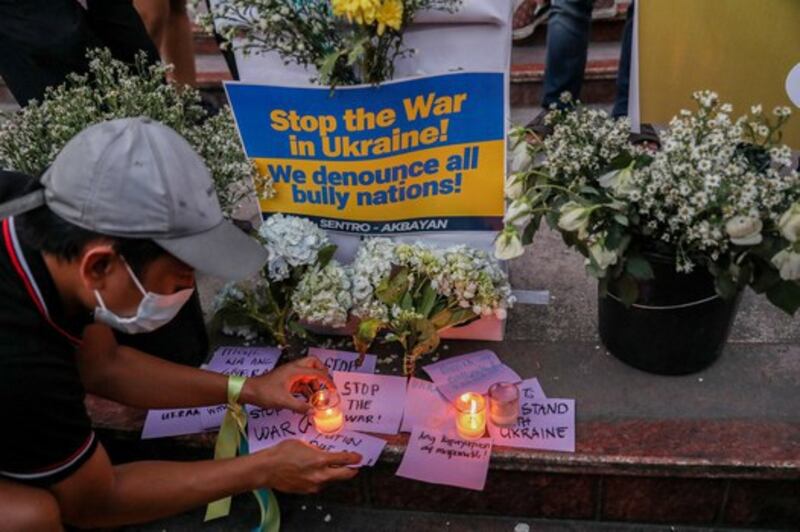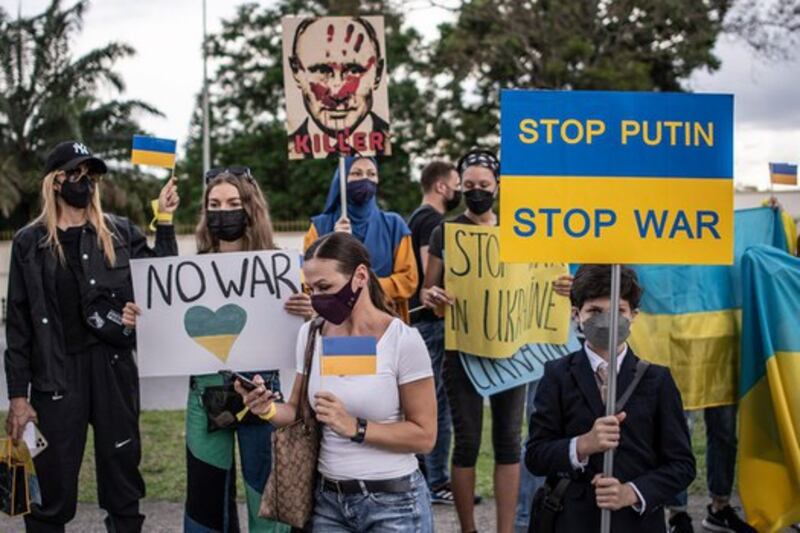Singapore broke from ASEAN’s line Monday by saying it would impose sanctions on Russia for invading Ukraine, after the Southeast Asian bloc, in a statement, neither condemned Moscow nor called the strike on its neighbor an invasion.
Singapore said it would suspend exports of items that could be used as weapons in Ukraine, and that it would block some banking and financial transactions connected to Russia. Analysts called the city-state’s move unprecedented.
“We are witnessing an unprovoked military invasion of a sovereign state as we speak …. Russia’s invasion of Ukraine is a clear and gross violation of the international norms and a completely unacceptable precedent,” Singaporean Foreign Minister Vivian Balakrishnan told parliament on Monday.
“[W]e will impose export controls on items that can be used directly as weapons in Ukraine to inflict harm or to subjugate the Ukrainians. We will also block certain Russian banks and financial transactions connected to Russia. The specific measures are being worked out and will be announced shortly,” he added.
Singapore and next-door neighbor Indonesia were the only Southeast Asian countries to condemn Russia’s Feb. 24 invasion of Ukraine, although the Philippines issued its own strongly worded statement on Monday.
Manila “expresses explicit condemnation of the invasion of Ukraine,” Foreign Secretary Teodoro Locsin Jr. said in a statement, adding that the country had voted “yes” on a United Nations General Assembly resolution condemning the invasion.
By contrast, a collective statement issued by the foreign ministers of the Association of Southeast Asian Nations was wishy-washy, according to analysts.
First, ASEAN did not mention Russia in the statement – at all. Second, the statement by ASEAN did not state that what was happening in Ukraine was an invasion. And third, ASEAN asked "all parties" to exercise restraint, in a situation where one country was defending itself from an invasion by a giant neighbor with superior military might.
In their statement, the ASEAN foreign ministers also put the burden of upholding “the principles of mutual respect for the sovereignty, territorial integrity and equal rights of all nations” on “all parties” rather than just the invading nation.
ASEAN’s bland statement did not surprise Southeast Asia analyst Derek J. Grossman.
“ASEAN predictably can’t bring itself to criticize Russia for invading Ukraine,” the senior defense analyst at the Rand Corp., a U.S. think-tank, said on Twitter.
“Thanks for nothing, ASEAN.”
Southeast Asia expert and academic Zachary Abuza commended Singapore for its stand.
“Once again Singapore is way out front of ASEAN: defending international law, imposing a swath of banking sanctions, a ban on export of dual use tech, travel restrictions, despite the short-term economic costs,” Abuza, a professor at the National War College in Washington, said on Twitter.
“Rare leadership from Southeast Asia.”
ASEAN’s statement also contrasted sharply with vocal protests against the Russian invasion that took place in Manila, Kuala Lumpur, Bangkok and other capitals of members of the regional bloc.

ASEAN Meeting in Washington
Separately, the United States announced Monday that it would host ASEAN leaders at a special meeting in Washington on March 28-29, the Associated Press reported.
“It is a top priority for the Biden-Harris Administration to serve as a strong, reliable partner and to strengthen an empowered and unified ASEAN to address the challenges of our time,” AP quoted White House press secretary Jen Psaki as saying in a statement.
The meeting comes as Washington is pushing to make the Indo-Pacific region a top foreign policy priority amid Beijing’s increasing assertiveness in the South China Sea.
Six Asian governments – including four ASEAN countries – have territorial claims or maritime boundaries in the waterway that overlap with the sweeping claims of China. While Indonesia does not regard itself as party to the South China Sea dispute, Beijing claims historic rights to parts of that sea overlapping Indonesia’s exclusive economic zone.
Lately, stability in Southeast Asia has been threatened with alleged incursions by Chinese vessels in the exclusive economic zones of Indonesia, the Philippines and Malaysia in the South China Sea.
Russia’s military strike on Ukraine has raised fears of similar actions by Beijing in areas it calls its territory.
“[T]his is something that creates a very dangerous legal precedent, especially for an assertive country like China that has repeatedly pushed for its own interpretations of international law, most clearly in the South China Sea,” National War College’s Abuza wrote in a column for BenarNews, an RFA-affiliated online news service, last week.

Evacuations
Meanwhile, Southeast Asian countries were working overtime to evacuate their nationals from Ukraine, either to neighboring countries, or to bring them back home.
On Feb. 26, two days after Moscow launched its invasion of Ukraine, Vietnamese Prime Minister Pham Minh Chinh signed a directive sent to all government agencies and provincial heads asking them coordinate in providing assistance to the 7,000 Vietnamese who reside in Ukraine, mainly in Kharkiv, Odessa and Kyiv, reported Radio Free Asia (RFA), the parent company of BenarNews.
Additionally, on Monday, Vietnam’s Civil Aviation Authority asked local airlines to work out plans by March 2 to bringing citizens home, RFA reported.
The sizeable Vietnamese community in Ukraine dates back to the 1980s, when Moscow signed an agreement with Hanoi to allow talented students to study or work in the country.
In Manila, the Philippines foreign affairs department said there were about 350 Filipinos living and working in Ukraine.
On Monday, the department said that about 40 of them had been evacuated safely to areas in Poland, Hungary and Moldova. Six of them have already arrived in the Philippines.
Meanwhile, independent reports confirmed by the Philippine foreign department said that “two vessels with Filipino crew members were hit by a bomb and shelling in the Black Sea.”
A Marshall Islands-flagged and Turkish-owned commercial cargo ship, the Yasa Jupiter, was hit by a bomb off the coast of Ukraine’s port city of Odessa on Feb. 24. Eleven Filipinos were among the crew members.
The Filipinos “were not hurt in the incident” and have already been in touch with their families back home, the department said, citing information gathered by Filipino diplomats.
Another vessel with 21 Filipino seafarers, the Japanese-owned, Panamanian-flagged grain bulk carrier M/V Nomura Queen was “hit by a missile strike in the Black Sea off Odessa and bore damage to its stern,” the department said.
"One Filipino crew member fell upon impact and sustained a non-life threatening injury while the rest of the Filipino crew are safe," it added.
The vessel was expected in Istanbul for repairs, and the foreign department said it was already in touch with its owner to monitor the condition of the crew.
Elsewhere, nine Malaysians and two of their dependents have been safely evacuated from Kyiv and were expected to reach Malaysia on Tuesday, Prime Minister Ismail Sabri Yaakob said Monday.
Indonesia has evacuated 31 of its citizens from Ukraine to Poland and Romania.
The spokesman for the Ministry of Foreign Affairs, Teuku Faizasyah, confirmed the news shared by the ministry via Twitter that 25 Indonesian citizens in Odessa, Ukraine had been taken to Bucharest on Sunday, while six Indonesians living in Lviv were evacuated to Poland on Monday.
The ministry said that there were 153 Indonesian nationals in Ukraine, most of whom lived in Kyiv and worked in the manufacturing and service sectors.
There are more than 350 Thais working Ukraine, said the Thai embassy in Warsaw, which has jurisdiction over the former Soviet republic. The embassy said that 99 Thais arrived in Warsaw and Bucharest on Sunday. But officials were most worried about the 14 Thais stranded in Kyiv a city near the border with Russia.
“Our top concern is Thai people stranded in Kharkiv, next to the Russian border. Due to the situation, we cannot take them out,” Chettaphan Maksamphan, the Thai ambassador to Poland, said on the Facebook page of the Ministry of Foreign Affairs on Monday.
“The situation in Kharkiv is really bad. We told those Thais to stay put,” he wrote.
BenarNews reporters Nontarat Phaicharoen in Bangkok, Ronna Nirmala in Jakarta, Suganya Lingan in Kuala Lumpur, Basilio Sepe and Jojo Riñoza in Manila, and RFA’s Vietnamese Service contributed to this report. BenarNews is an RFA-affiliated online news service.
